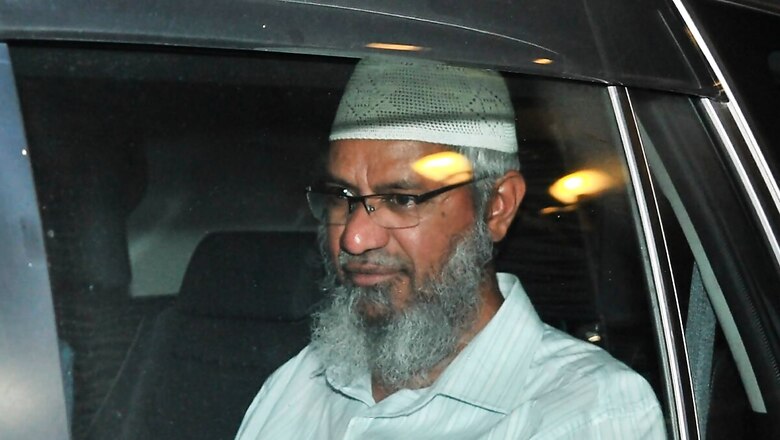
views
Controversial Islamic preacher Zakir Naik is currently on a visit to Pakistan, where he is scheduled to deliver a series of public lectures across major cities, including Karachi, Lahore, and Islamabad, from October 5 to October 20. His arrival at the invitation of the Pakistani government has ignited considerable concern regarding the potential ramifications of Naik’s ideology on a nation already wrestling with escalating fundamentalism and sectarian violence.
Born in 1965, Naik is infamous for his provocative and often divisive sermons that have gained a global audience. His lectures advocate a stringent interpretation of Islam and frequently challenge the beliefs of other religions, asserting a narrative of Islamic superiority. In 2016, he fled from India amidst allegations of inciting terrorism and hatred, subsequently finding refuge in Malaysia. Since then, he has continued to attract significant attention, both from supporters who view him as a visionary promoting interfaith dialogue, and critics who contend that his rhetoric often strays into incitement, fostering fundamentalist interpretations that may lead to radicalisation.
Zakir Naik’s Influence on Extremists
One of the most concerning aspects of Naik’s influence is its documented ties to extremist groups. In the past, multiple Bangladeshi militants have openly acknowledged being inspired by his teachings. Particularly alarming is the fact that Bangladeshi youth who carried out the 2016 Dhaka café attack at the behest of ISIS ideology had cited Naik’s lectures as a crucial motivating factor behind their actions. These admissions reveal a disturbing truth: Naik’s sermons are not merely educational but can act as a conduit for violent extremism.
In light of this context, his forthcoming lectures in Pakistan are especially troubling. The country has long struggled with fundamentalist ideologies, resulting in the emergence of extremist factions that target minorities and incite sectarian violence. Naik’s presence is poised to intensify these tensions, further polarising an already divided Pakistani society.
For decades, Pakistan’s landscape has been deeply scarred by religious extremism. The emergence of fundamentalist groups has not only jeopardised the secular fabric of society but has also incited violence against religious minorities. Communities such as Ahmadis, Christians, Hindus and Shias have endured systemic discrimination, violence, and persecution, frequently rationalised by extremist interpretations of Islam. As the nation continues to grapple with its multifaceted identity, the influx of radical ideologies presents a significant threat to its minorities. The Pakistani government has made no efforts to counter extremist narratives and hence the societal currents of fundamentalism remain robust.
Minorities Under Threat
The minorities in Pakistan—particularly Ahmadis, Christians, Hindus and Shia Muslims—are surviving in a precarious situation. Ahmadis, for instance, are legally designated as non-Muslims and have to endure persecution, violence, and even murder. The blasphemy laws, frequently exploited to target these communities, have resulted in mob violence and wrongful imprisonments. Christians and Shia Muslims also face targeted assaults from extremist factions that aim to impose a singular interpretation of Islam. In such a hostile environment, the teachings of a figure like Zakir Naik, which often promotes a constricted view of Islam, can foster a culture of intolerance and violence.
The Impact of Naik’s Lectures
Zakir Naik’s lectures, marked by their incendiary rhetoric, pose a significant risk of further alienating vulnerable communities. His focus on a rigid interpretation of Islam can exacerbate existing prejudices and intensify sectarian tensions. For instance, if Naik’s messages promote the notion that only one interpretation of Islam is legitimate, it could legitimise violence against those with differing beliefs. Furthermore, his presence in Pakistan would embolden radical factions within the country, who perceive his visit as an endorsement of their extremist views.
This scenario presents a dual threat: it not only jeopardises the safety of minorities but also undermines the broader objective of cultivating a more pluralistic society in Pakistan.
The response to Naik’s visit has been mixed in Pakistan. While some segments of the population welcome his messages, many others, including political leaders, have voiced concerns about the potential repercussions of his presence. Particularly in a climate where sectarian violence and discrimination are on the rise.
Zakir Naik’s visit to Pakistan presents a complex situation that intertwines with the country’s ongoing struggle against fundamentalism and sectarian violence. As he prepares to deliver his lectures, the potential repercussions for the nation’s minority communities are significant. It is crucial for Pakistan to confront the underlying factors that allow extremist ideologies to thrive while promoting a culture of tolerance and inclusivity. In navigating this delicate landscape, the way forward must be rooted in respect for diversity and a commitment to safeguarding the rights of all citizens.
If Zakir Naik is given a free hand, it could have serious implications for Pakistan’s stability.
The writer is an author and columnist and has written several books. His X handle is @ArunAnandLive. Views expressed in the above piece are personal and solely those of the author. They do not necessarily reflect News18’s views.













Comments
0 comment